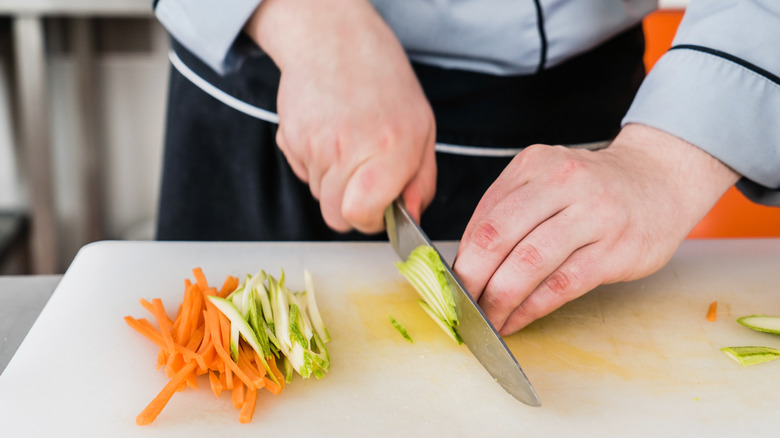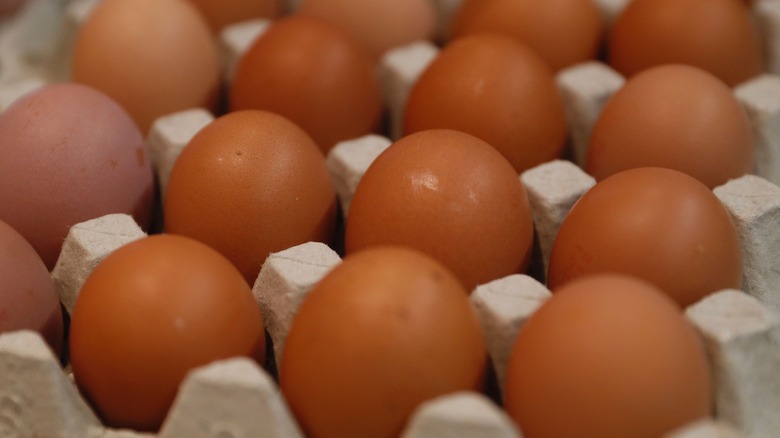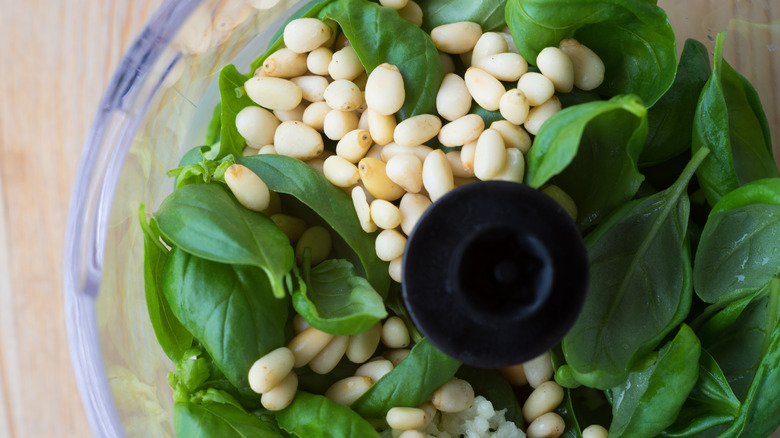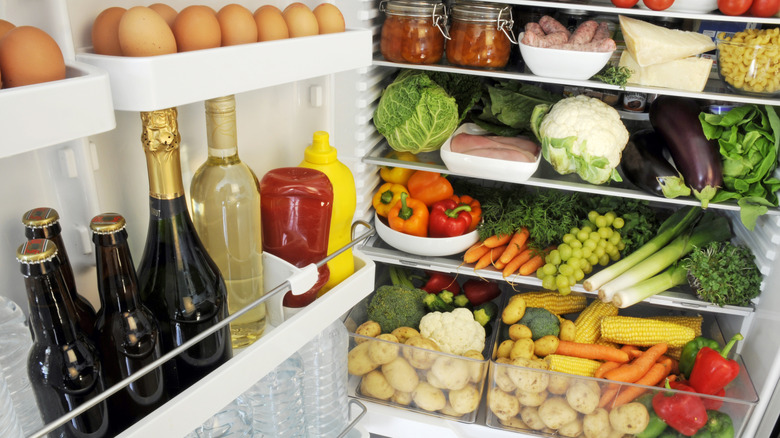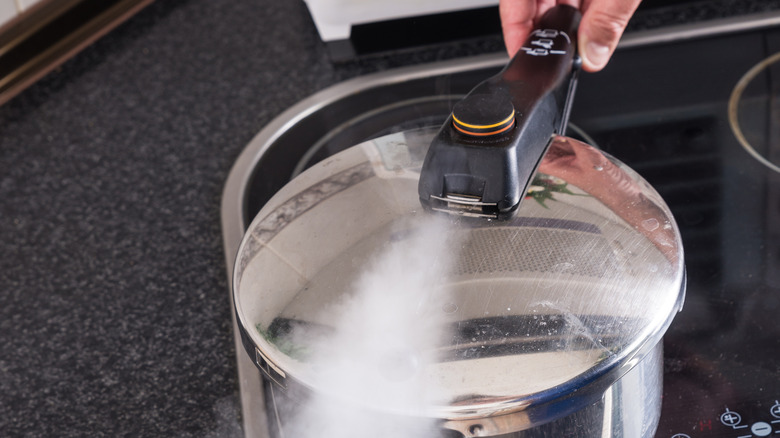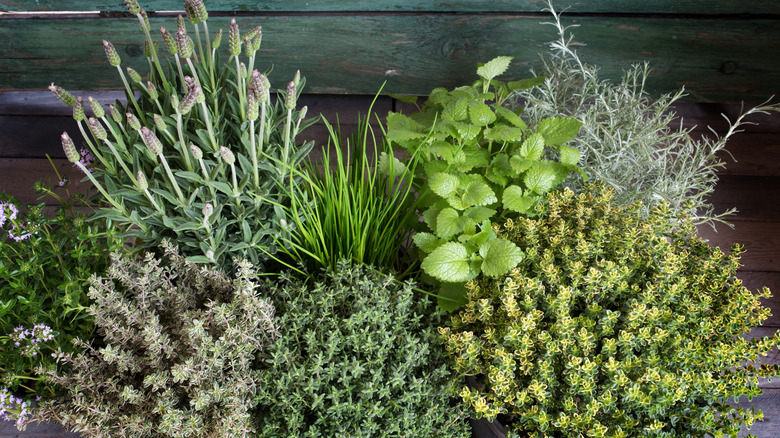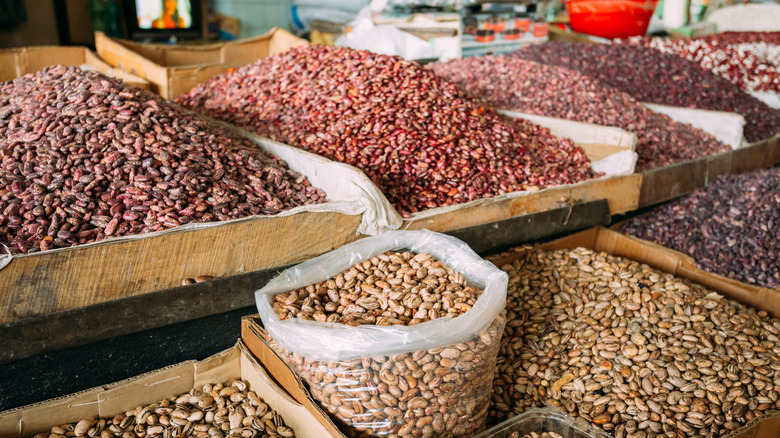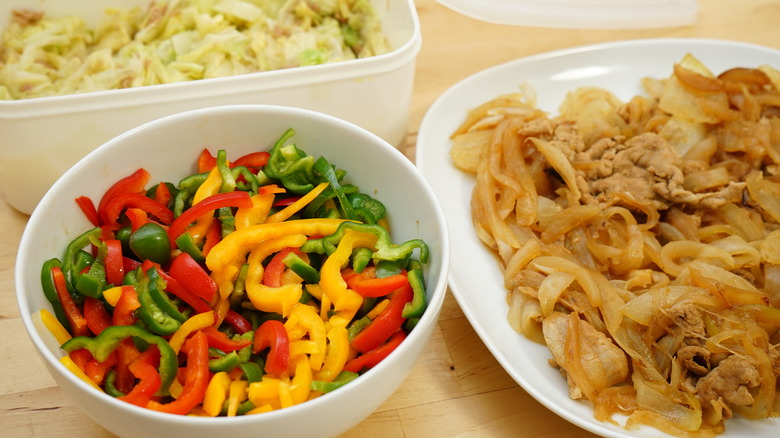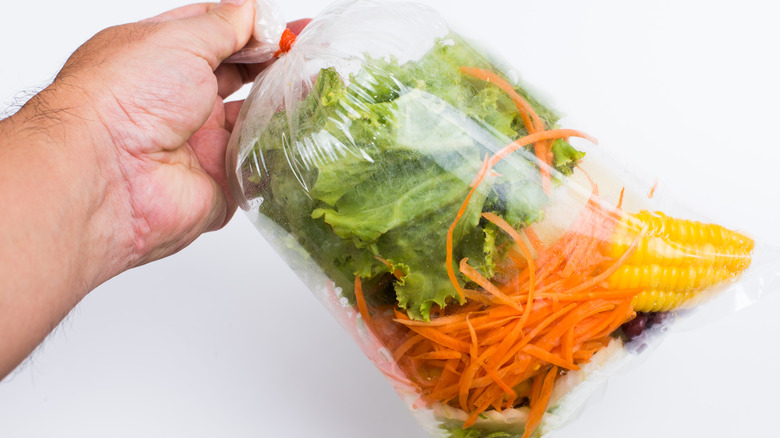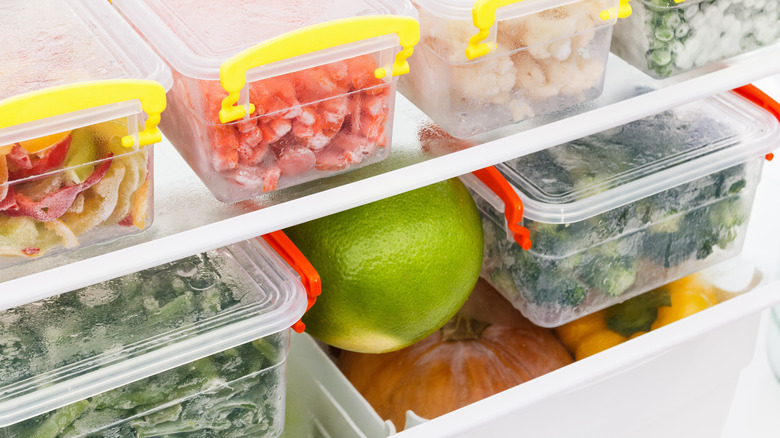Meal Prep Hacks To Make Your Life Easier
We may receive a commission on purchases made from links.
These days, when we're expected to work a full-time job, maybe also a side-hustle, take care of our families, clean, and cook, we aren't afforded the luxury of "taking our time." And often, when we've gotten home from work and we're trying to scare up dinner, it can be tough to find inspiration to make meals that are both healthy and tasty.
But there are some tried-and-true things you can do to master mealtime. I spoke to some experts about what they do to get awesome dinners on the table, and I'm sharing some of my favorite tips as well. These meal prep hacks are guaranteed to make your life easier.
Cook your eggs ahead of time
Eggs are a versatile, protein-packed must-have for your kitchen. Lisa Cohn, registered dietitian at miVIP Surgery Centers, told me, "Hard-boiled eggs are easy and inexpensive, as are fresh eggs poached over toast. I often make family-style omelettes and frittatas with added vegetables, and pair them with low-fat cheese and fruit." And they're not just for breakfast, either. Cohn continued, "Eggs are truly an anytime meal. Serve with a homemade frozen fruit smoothie for optimal nutrition."
If you need to make a bunch in advance, using your oven instead of the stove-top can be a great kitchen hack. Hope Pedraza, certified personal trainer and nutrition coach, and founder of inBalance, told me, "You can usually only fit up to five eggs in a pot. Make a dozen in one go by baking your eggs in muffin tins for just 30 minutes. You'll get a perfectly hard-boiled batch and can refrigerate for the week and eat as you need to!" That way, you'll always have healthy snacks and meal proteins handy.
Get a food processor
It's amazing to watch TV chefs, with knife skills that make chopping vegetables look like second nature. I don't even look that good in slow motion. And as much as I love to cook, I'll never be an Iron Chef who can julienne a carrot in the space of thirty seconds.
But that's why I have a food processor, which is such a time-saver when prepping meals. You can chop vegetables almost instantly, and consistently, for sautées, salads, sofrito (a personal favorite), and more. Registered dietitian Molly Morgan, owner of Creative Nutrition Solutions, told Self, "I use both a large 11-cup food processor and a smaller 7-cup food processor. I especially like the food processor for making creamy and smooth hummus, for quickly whipping together energy bites with grains and dates, and for instantly grating vegetables that I'll add to soups, sauces, and more." Morgan continued, "I also have a 1-cup food processor that is perfect for small, quick jobs like chopping nuts for a recipe or a yogurt topping!"
Make your fridge a salad bar
Rebecca Lewis, registered dietitian at HelloFresh, told me, "I turn my fridge into a salad bar so that all I have to do is customize and combine individual ingredients for a different salad each day." So what does she recommend?
— Stock up on citrus (lemon, lime, and orange) to make a quick and easy vinaigrette (a simple squeeze of the fruit, plus olive oil and vinegar)
— Measure out 1-ounce Ziplock baggies of nuts (almonds, cashews, pistachios)
— Pre-cook whole grains (quinoa, brown rice, and whole wheat pasta)
— Rinse canned beans (black beans, garbanzos, and butter beans)
— Wash fresh greens and herbs (spinach, romaine, parsley, cilantro)
— Chop raw veggies (sliced red bell peppers, broccoli cut into florets, peeled carrots, diced tomatoes)
— Hard boil eggs
— Roast sweet potatoes, beets, or other root veggies
This makes it super easy to throw together a different, satisfying salad every time!
Use a pressure cooker
Pressure cookers are fantastic kitchen tools: you can cook tender, fork-apart meats in a fraction of the time that it takes in a slow cooker. Plus you can often skip any fats and oils that you might ordinarily need if you're frying.
What other kind of things can you make in them besides animal proteins? Registered dietitian Dr. Jennifer Bowers told me, "I like to make a batch of spicy pinto beans to keep on hand in the fridge for quick weeknight burritos. Using a pressure cooker allows me to use dried beans (super cheap) and cook them in about 30 minutes." And don't forget to spice it up to make sure your food packs lots of flavor. Bowers continued, "Adding a few jalapeños, garlic cloves and cumin makes them perfect." You can also do this with grains. Bowers says, "Pressure-cooking batches of rice, farro, quinoa or other grains helps keep weekly meal prep time to a minimum."
If you're intimidated by traditional, stove-top pressure cookers, you can buy electric pressure cookers that have a variety of other functions built-in, such as slow cooking, rice cooking, and simmering. Throw in a frozen chicken breast, with a little sauce and water, and you've got a dinner protein ready in five minutes.
Buy seasonal produce
I've lived in different regions of the US as well as abroad. One thing I always do is buy seasonal produce — it's going to be the most plentiful, cheap, and flavorful. For example, in Florida where I live, there's nothing like citrus season, when amazing oranges and grapefruits are everywhere. I'll make a lot of citrus vinaigrette during those months, and season with a lot of lemon. When I lived in Jordan, I was all about cucumbers and tomatoes on everything.
Dr. Bowers also buys seasonal produce, and had some tips on maximizing your bounty. She said, "Buying strawberries, blueberries, asparagus, mangoes, and zucchini in bulk when they are in season and on sale is key for me. I freeze the berries and mangoes for smoothies or baking. Freezing asparagus for use in frittatas later works great, and on-sale asparagus is typically a fantastic economical deal. Shredded zucchini freezes well for future zucchini bread and muffins. Taking advantage of seasonal on-sale produce eases the burden on your wallet, allowing you to eat nutritiously all year."
Grow your own herbs
Not everyone has a garden or even the space to plant herbs in the ground. But even if you don't, you can still grow herbs on your porch, patio, or kitchen window. Currently, I have both a basil and a dill plant, so I always have fresh dill for my salmon, and basil for my pesto. And I love throwing fresh herbs on my husband's standard bag-lunch sandwich, giving it a pop of earthy green.
This will save you money, too. Registered dietitian Jen Haugen, author of The Mom's Guide to a Nourishing Garden, told Self, "In the spring and fall, I plant seeds for basil, cilantro, and parsley, my most frequently used herbs in cooking. I keep them indoors but by the window for good light. I then am able to clip from them all year rather than going to the store to buy the herbs needed. It's easy, and it's fun to grow your own food!"
Buy in bulk or on sale
Having a variety of ingredients at your disposal — from vegetables, to grains and proteins — is vital for a successful home kitchen. One way to make sure you always have these staples, without overspending, it buying bulk items, or items that are on sale. My local grocery store has different BOGOs every week, so I can get my stocks, pastas, proteins, and even vegetables for half-price if I plan accordingly. I also, like so many people, get great deals on frozen proteins at big box discount stores.
You can also do this with a crowd favorite: cheese. Toronto-based registered dietitian Micah Grobman told me, "Cheese is a calcium and protein-rich food that packs a punch of flavor. When cheese goes on sale, I buy a big block, grate it right away, and portion it into plastic baggies (in 1/2 cup portions) for a quick and budget friendly meal solution when a lasagna, pizza or pasta craving strikes."
Re-purpose your leftovers
Re-purposing leftovers is, for many home cooks, a tried and true practice. But there are ways to do it that aren't boring — you can only reuse an item, or have the same thing twice in a row so many times before you become uninspired.
Hope Pedraza told me that you can "re-purpose main course items (like protein) into something new. For example, plain chili one night can be turned into tacos the next, or it can top spaghetti, rice or another grain. You can also make a pesto, spicy tomato sauce, dressings, or various vinaigrettes and sauces during your meal prep time to add a new flavor to leftovers to give your family something new, and keep them from getting bored."
Registered dietitian Courtney Ferreira, owner of Real Food Court LLC, told me, "At the end of the week take your uneaten veggies and whisk with eggs and milk to create a simple egg frittata or crustless egg bake. Enjoy as part of a tasty weekend brunch or use for a quick, heat-and-eat weekday breakfast. My favorite part about this hack is that it helps to cut down on food waste!" So you end up with an entirely new and special dish, if you make it part of your Sunday brunch menu.
Pack your salads in ice
Packing lunches for yourself and your loved ones can be a challenge. It's easy to get tired of the same old turkey sandwich, which can make hitting the drive-through much more tempting. But in order to spare yourself the cost of paying for lunch every day, throw in a salad once in a while for variation. It's easier than you might think.
Dr. Philip Goglia, founder of G-Plans, told me, "Most people don't think salads are as easy to bring as, say, a ham sandwich and chips. Make salads more convenient by buying bags of salad that are already pre-made, and bringing them to work with a container." He notes that swapping out the dressing from bagged salads for a homemade vinaigrette could be beneficial if you are limiting your fat and calorie intake.
No access to refrigeration at your job? No worries. Goglia continued, "Another way to make salads easier is to put them in a Ziploc baggy, than put that baggy inside another that has ice in it. You can keep the salad crisper, and you just need to keep a bowl at your desk to eat it in." That way you won't have to struggle for fridge space on the job.
Schedule your prep time
If you're like me, you have to allot time for food prep in order to stay on track: breakfast prep the night before, dinner prep at least an hour before dinner (don't forget to defrost your protein), and packing work lunches so they're ready to grab on the way out the door.
All of this is easier if you actually plan for it, and keep it written down on your calendar just as you would anything else. Grobman told me, "My meal prep day is scheduled in my calendar just like a doctors appointment. I allot a specific day and time frame for it to be done. That way, there are no excuses and no lunches left unmade."
Tailor your prep times accordingly, and schedule it just as you do your daily exercise or leisure time. You'll save money, time, and groceries, with the foresight to make it a priority.
Use your freezer
Last but certainly not least, utilize your freezer. It's probably my number one time and money saving method. I make a monthly trip to a big box discount store to pick up chicken breasts, salmon fillets, bags of shrimp, and frozen burritos. That way, I can always remember to defrost a protein the night before for tomorrow's dinner — hard to make an excuse for dinner when you're not lacking in anything ready to cook.
And freezers can be used for more than protein storage, too. Angela Mader, a certified personal trainer, told me, "After weekly grocery trips, pre-portion fruits in individual bags with a handful of spinach and pop in the freezer! That way you just toss it in the blender with some coconut or almond milk in the mornings and it's a quick, healthy breakfast."
Finally, don't underestimate frozen fruits and vegetables. They're cheap to buy, and they have a long shelf life in your freezer. Pop a steamer bag of broccoli in your microwave, and you have a green vegetable ready to go.
Making effort ahead of time
Meal prep is a lot easier when you take the time to think ahead. But that doesn't mean you have to have a perfect month of meals planned out in advance, with all ingredients on hand (— if only it were that easy!).
If you implement strategies to save you time when you need it — and allow for improvisation — you'll avoid throwing up your hands and ordering take-out. So, that little garden of herbs you grow, or that stash of prepared proteins, can save you money and time, and often give you just the inspiration you need!
